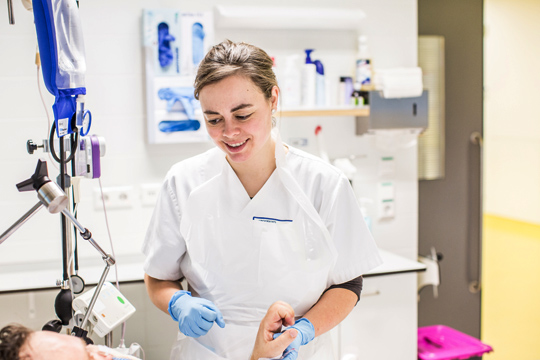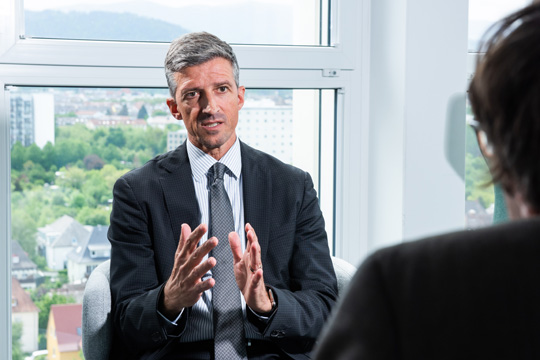“Generating and sharing knowledge”
Freiburg, Aug 08, 2019
At the start of 2019, Prof. Dr. Frederik Wenz was named Medical Director and Chairman of the Board at the University Medical Center Freiburg. From 2014 to 2018 the radiation therapist was Medical Director at University Hospital Mannheim and Director of the Department of Radiotherapy and Radio-oncology, which he established, as well as the Interdisciplinary Tumor Center. Nicolas Scherger asked him about his first semester in Freiburg and his plans for the University Medical Center.

Frederik Wenz regrets the commercialization of the health care system: "Whoever chooses care and medicine as a professional field wants to help people and cure illnesses first and foremost." Photo: University Medical Center Freiburg/Britt Schilling
Mr. Wenz, why did you decide to move to Freiburg?
Frederik Wenz: I did not actually apply for the position. Instead, I was asked to come here. I was very comfortable in Mannheim, but I had an emotional connection to Freiburg. As a teenager, I spent several months as a patient in the hospital, including here at the University Medical Center, which strengthened my desire to pursue a career in medicine. But above all, after a sober analysis, I saw the opportunities in Freiburg such as the scientific excellence of the hospital and the University, the size, efficiency and treatment quality of the hospital, the environment of companies and start-ups, a combination with enormous potential.
What goals have you set for yourself here?
We are faced with a lot of challenges in university medicine in Germany suc has bottlenecks in financing, congestion in building development and digitization, and the recruitment of outstanding medical and nursing staff. These are issues that everyone is worried about. In Freiburg we have set ourselves the goal of expanding quality-centered university medicine. We want to generate and share knowledge. If we consistently record data electronically, it is a much better solution than relying on classic file-based evaluation. Student teaching is a central task, but also the further education and training of young doctors at home, in the region and throughout Germany – and even a smaller hospital or one in a developing country should be able to share the knowledge of an excellent center.
What vision do you associate with digitization?
The Big Picture is quality assurance in real time from which patients benefit directly. At the moment a patient is treated, the treatment is documented, then quality assurance steps in when the case is closed, and at the end of the quarter you get the feedback. It is a process that only benefits future patients. That is why we have to further develop our systems in such a way that we receive feedback during the course of treatment as to whether the patient is being treated optimally. We also want to strengthen patient autonomy. For example, apps are being developed with which patients can report back to us their further healing process once they have left the hospital.
How do you envision working with the University?
I find it exciting to be at a university hospital because there are so many links to other disciplines. The life sciences are at the forefront because there is a bridge between basic research and clinical research on patients. However, there is also close cooperation with the Faculty of Engineering. And in a comprehensive university, we can create the societal superstructure because medicine in particular is always concerned with ethical and moral questions, which we want to discuss with colleagues from the fields of law, theology and philosophy.

As a teenager, Frederik Wenz spent several months as a patient in the hospital, including at the University Medical Center Freiburg, which strengthened his desire to pursue a career in medicine. Photo: Klaus Polkowski
What kind of construction are you planning next?
We have a heterogeneous structure on campus. The patient rooms in the historic buildings on the Lorenzring have not changed in the last 30 or 40 years and are really antiquated, which is why we are working hard on renovation measures. Work is underway on the new buildings at the children’s clinic, and we hope to be able to move into them in 2023. We are also planning for areas in surgery, nuclear medicine, anatomy and a ward for internal medicine. Over the next few years, we will be working with the University to set up a teaching campus on the grounds of the current children's clinic. And the districts of Kleineschholz and, in the mid-term, Dietenbach will open up prospects for creating new living space for employees.
At the University Hospital Mannheim you took on a lot of responsibility in hard times. The clinic had gotten into financial difficulties with negative national press because of contaminated surgical instruments. Which experiences were particularly influential for you?
I certainly got an up close and personal look at crisis management. It is not the kind of thing you wish for, but it can also be very valuable. I saw how it is possible for a team to come together really well in a time of crisis. The will was there to move forward again, to change and to position oneself for the future. That was also the summary after four years as Medical Director and Managing Director. Although the finances were not yet in order, we built up lean structures and profiled the service portfolio so that the clinic is sustainable in the long term.
In the public debate, health care costs often overshadow medical performance. How frustrating is that?
I regret the commercialization of the health care system. It has been proven that the attempt to save money partly leads to higher costs. The important thing is to do the right thing at the beginning and not save money in the wrong place. If a patient is not treated optimally for cost reasons and then perhaps gets an infection, it will fall on your shoulder afterwards. On the other hand, employee motivation falls by the wayside if every job is evaluated in euros - whoever chooses care and medicine as a professional field wants to help people and cure illnesses first and foremost.
What solution do you see for it?
Internationally, we are increasingly moving in the direction of value-based payment, i.e. according to the quality of treatment rather than the individual procedure. Then everyone suddenly has a renewed interest in keeping people healthy and doing just the right thing, not too much and not too little. From my point of view, this would lead to a reduction in costs and, above all, a significant increase in motivation in medicine and care.
Since you took office, the board of directors at the hospital has been reporting on its work in podcasts on the intranet. What kind of response are you getting?
It is hard to say just yet, but I think it has met with a great deal of interest overall. The "Questions to the Executive Board" concept has also met with a noticeable response. On the intranet, our employees can ask questions that are put to a vote, and the three questions with the most votes are answered by the Board of Management. I am very convinced that it will strengthen participation, which is a central concern for us. We are an organization supported by our 12,000 employees. They have so many good ideas for further developing the University Medical Center and leading it into the future.

